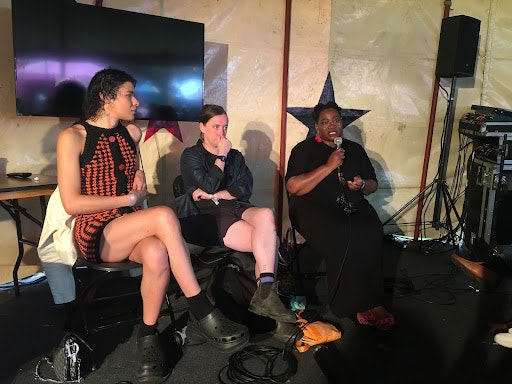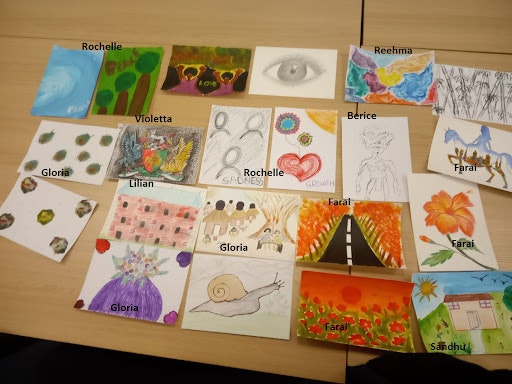The injustices of financial exclusion faced by asylum seekers, refugees, and migrants

Re-imagining the economy: An interview with Last Mafuba, Founder and CEO of mental health charity, Inini. Content Trigger warning: The following article contains a brief reference to suicide.
March 28, 2022
When discussing the economy, there is often an unspoken presumption that we all have unrestricted access to financial services and are free to make payments for all of our basic needs. However, this isn’t the case for everyone living in the UK – especially as financial services are becoming more difficult to access. Banks have been accelerating branch closures throughout the pandemic – with 736 closing in 2021 alone and almost 5000 closing since 2015. And according to LINK, the UK’s largest cash machine network, 13,500 free-to-use cash machines have closed down between January 2018 and December 2021, leaving the UK with just 41,000 across the entire country.
Towards the end of last year, we launched the 12 Days of cash social media series to highlight how the disappearance of cash impacts various groups who are marginalised by structural inequalities, perpetuated both by the government and the financial system. Oftentimes, people in these groups are forced to operate within the confines of the shadow economy, as they are systematically denied access to public services by the state.
Refugees and asylum seekers face these challenges on a daily basis. These groups have limited access to the economy as they are denied the right to work and are unable to access a regular bank account. Instead, they’re issued prepaid cards which can only be used in certain shops. Cash withdrawals are strictly prohibited, meaning that many parts of the economy are effectively shut off to undocumented people.
To better understand the day-to-day realities of the refugee-migrant community, we sat down with Last Mafuba, the founder and CEO of Inini Initiative Ltd — a social enterprise that promotes community cohesion by supporting asylum seekers, refugees and migrants with culturally sensitive approaches to easing integration. In our interview, Last breaks down the impact of the hostile environment and how this has prevented asylum seekers from participating in the economy. We explored the difficulties people face during the asylum process, the impact it has on mental health, and how Inini has been working to overcome these barriers.
“You’re not even allowed to put money aside in the bank to do transactions in the bank, which means that the economy is inaccessible to asylum seekers.”
Last arrived in the UK from Zimbabwe. She describes herself as one of the “lucky ones”, having her asylum application accepted within three weeks, which is extremely rare. Analysis from the Refugee Council reveals the average processing time for asylum applications is between one and three years. It was volunteering that made her aware of the similarities between the people she worked with and her own experiences that led her to found Inini.
Last explains how the immigration process has been designed to discriminate against asylum seekers, leaving them unable to participate in the economy at all: “The immigration policies are designed so that asylum seekers are not allowed to work and they are not even allowed to open a bank account. So how do you participate in the economy when you’re not bringing anything into it?”
“And besides, they don’t even have the money. You are given £35 a week, not even enough for your food. You have to choose between catching a bus to go see your solicitor or to buy food. You have to choose because the money is not enough for you to be able to participate in the economy.” The remnants of the hostile environment can be used to dispel myths often propagated by politicians and the far-right media regarding migration in the UK. Common beliefs include migrants arriving to the UK for the sole purpose of claiming benefits and/or stealing jobs. However, legislation such as the Immigration Act 2014 prevents banks and building societies from opening bank accounts for undocumented migrants and the Immigration Act 2016 prevents ‘illegal working’ and employers from hiring ‘illegal’ migrants. These policies circumvent anti-migrant narratives used to discredit the motivations of people coming to the UK.
Last points out how the banking system discriminates against people with status as well, “They call it the hostile environment where if somebody wants to rent, they have to produce their paperwork for them to rent a house. I have paperwork to live in this country, but before I had my British passport, this was not long ago. This is just, I think around October, November, I was trying to open a bank account for this organisation that I started with two colleagues. But because I was using my residence permit, that bank would not allow me to open the bank account.”
Last continues, “This is how bad it is, because then we were doing everything online. What I didn’t like about the whole thing, what frustrated me was the fact that there was no link for you to submit a residence permit like I have, but there was a link to submit an EU ID. You see what that means? And they do it knowingly. It’s not like they don’t know. They will frustrate you and you’re not talking to anyone. This is just the machine. It’s been designed that way to reject your application.”
“So you can imagine if they cannot take a residence permit, what chances does an asylum seeker have? Yeah, it’s just bad.”
Despite these complications, Inini has been tantamount in providing a safe space for members of the refugee-migrant-community to feel at home by allowing them to come together to challenge the myriad of barriers instigated by the hostile environment, “I find that the peer support group is the best to date. It’s the best weapon for overcoming challenges. The isolation is gone because you’re all together.” Last explains how the sharing of food from each service users’ home country provides a unique opportunity for them to bond and share their stories with one another, “I think food symbolises hospitality to most of them, so they eat. Then we introduce topics, difficult topics. It could be about mental health or any difficult domestic abuse, violence, whatnot [but] you will find that people warm up and they engage better, and in the end, they have become like family.”
Those with unsettled status are left with no recourse to public funds (NRPF), resulting in many being left destitute or reliant on charities like Inini for sustenance. “Homeless asylum seekers, those with NRPF were put into hotels, right, with no food. So I would make meals at home and I had someone come to pick them [up] and deliver them. And these are traditional African meals that I would make.” Last told us that she helped someone who had attempted suicide and was sectioned during the second nationwide coronavirus lockdown. This reinforces the detrimental impact the hostile environment has on people going through the asylum process in the UK.

Last Mafuba (far right) speaking on the Decolonising Economics – Economics from the Margins panel at The World Transformed festival in Brighton, September 2021
Last also related her own experiences within the immigration system to us, explaining what led her to volunteer with Coventry Refugee and Migrant Centre:
“When I was going through the asylum process, I had a mental breakdown and I really struggled to find adequate mental health services that catered for my needs … What I realised was the challenges that we face trying to integrate usually are the basis of mental health issues… I’m sure you’ve read where Black people are overrepresented in mental health issues – [but] they don’t engage with mental health services, they disengage.”
According to the Mental Health Foundation, refugees and asylum seekers are more likely to experience mental health problems than the general population. And when you factor in ethnicity, in the year to March 2020, Black people were four times more likely to be detained under the Mental Health Act. This, compounded with the barriers to economic participation, highlights the myriad of challenges these groups face.
Last points out how inadequate mental health services are in the UK to cater for the specific needs of migrant communities, “And [you’re] probably offered some intervention where maybe, let’s say it’s talking therapy. You want me to go to talking therapy and still come back to face the same problem that is causing me mental health issues, and you expect me to recover and thrive? That’s not doable.”
This is where Inini comes in, by offering information and support to migrants arriving in Coventry, “We tell them what services are available and how they can be accessed. We offer one-to-one counselling sessions. We have a weekly peer support group. We offer advocacy where sometimes, for example, people are in debt, but they don’t have the skills to speak to the service provider.”

“There is always hope. We are all like boats in life, free to go wherever and spend time. This digital drawing of mine shows that in the end there is always a port and land for boats to calm and stop. Even after crushing, you find a boat part on the beach. There is always hope and place to calm, rest. The Bird also shows that it wanted to stay at a calm and quiet place. We need that, we have hope.”
Artwork and quote above by Rawand.
Alongside advocacy services, Last is aware how important it is to provide a wide range of activities for group members to explore their creativity and to help them integrate with the local community: “Because I’m thinking within the refugee-migrant community […] they are talented, so I am just tapping into that and making sure that they use their skills and that on its own is good therapy for their mental health.”
“For example, we have collaborated with the Belgrade Theatre and the Herbert Art Gallery, which are entities here in Coventry, and ask them to create opportunities where Black people can come in and showcase their skills.”

Artworks by people affiliated with Inini.
Last demonstrates how Inini adopted a more nuanced approach to mental health provisions for migrants by tapping into the performing arts and the creativity of the people she works with. However, she acknowledges how these are micro-level solutions within a system that isn’t well-adjusted to the diverse needs of such groups.
“When I first arrived at my first hostel, they picked up straight away that I was depressed, but I think they did because I could speak English. So it’s easier when you’re conversing with somebody you can tell, but if it’s somebody with a language barrier, how do you know that’s one of their challenges? So there’s the language, there’s the isolation and then there’s the lack of information.”
Last’s support group demonstrates the importance of compassion when dealing with refugees and asylum seekers, something that has been inexplicably denied to those stuck within the immigration system. Instead, the hostile environment permitted, and often encouraged, a culture of xenophobia, hostility and violence towards migrants that has been perpetuated both by the media and politicians. Despite the government appearing to atone for these racist policies, these traits still remain and are present within more recent legislation such as the Nationality and Borders bill which has been subject to backlash and public protest.
Last week, the government voted through clause 11 of the bill, meaning that asylum seekers arriving to the UK via ‘unofficial’ routes could face jail time or be sent to an offshore processing camp. With thousands of refugees fleeing Ukraine, the government is making it even more difficult for people to seek asylum here – and even if they do manage to arrive safely, they’ll be shut out of the economy due to the hostile environment.
“On a structural level, make it easier for people to open bank accounts, give people the right to work.”
Last is adamant that it is draconian policies like the Nationality and Borders bill that make life much more difficult for members of her support group. She goes on to point out what needs to be done to resolve this: “On a structural level, make it easier for people to open bank accounts, give people the right to work. When they get to the UK, they are in the asylum process, they are processing their papers and they aren’t working, they are fending for themselves.”
“You know, when you have to live on handouts, it strips you of your dignity and your self confidence [having] to be dependent on somebody else. And we all know that when somebody gives you something, it is because they want to control you – so structurally remove all [of these] barriers that restrict people from getting work, let people work.”
To find out more about Inini’s work or to donate, click here.
Coventry Asylum and Refugee Action Group (CARAG) is a migrant-led grassroots community organisation which you can read more about on their website. CARAG also has a podcast that you can listen to here.
Featured image: Rawand, “The young artist”. This artwork is an excerpt from an upcoming Zine.